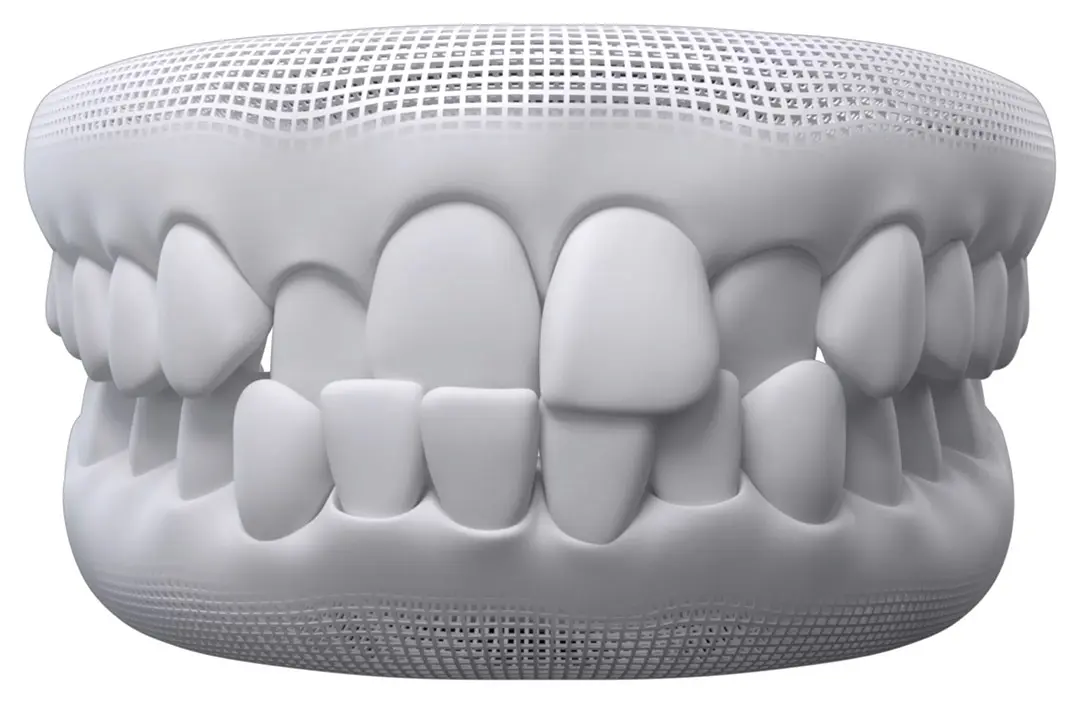Crossbites and crossbite correction

When you bite down, do your top teeth position themselves inside your bottom teeth? If so, you may have what’s known as a crossbite.
What is a crossbite?
According to the Farlex Partner Medical Dictionary, the definition of a crossbite is an abnormal relationship of one or more teeth of one arch to the opposing tooth or teeth of the other dental arch.
Like the underbite and overbite, a crossbite is a type of malocclusion which, in simple terms, is a misalignment of the teeth or jaw when you close your mouth. There are different types of crossbites and treatment depends on your particular case and its cause.
Crossbite causes, symptoms and complications
What causes a crossbite?
-
Hereditary factors
-
Abnormal growth of adult teeth before children have lost their baby teeth
-
Thumb sucking is a common crossbite cause because children flex their cheek muscles, which may alter upper jaw formation
-
Mouth breathing, due to conditions such as Chronic Nasal Obstruction or enlarged tonsils, is closely related to increased crossbite cases as it hinders upper jaw growth.
What happens if a crossbite is not corrected
Is having a crossbite a problem? Even if your crossbite teeth aren’t causing issues today, having a crossbite can lead to complications that may affect your overall health and wellbeing. Some crossbite complications and symptoms include:
Crossbite symptoms and complications
-
Cheek biting, teeth grinding and trouble chewing
-
Gum disease that can lead to bone loss and loose teeth
-
Excessive and faster than usual wear and tear on the teeth
-
Jaw muscle stress, leading to jaw, neck and shoulder pain in serious cases
-
Lower self esteem and social issues due to facial asymmetry
-
TMJ disorders
The different types of crossbites
Crossbite types are determined by their location in the mouth, whether your crossbite teeth are closer to the cheek or tongue and what’s causing the crossbite. Take a look at the different types of crossbites below.
Posterior and anterior crossbites
Doctors classify crossbites according to their posterior or anterior location in the dental arch of your mouth.
-
Posterior crossbites develop in the back of the mouth when the top teeth or jaw are narrower than their bottom counterparts. The top back teeth bite down inside the bottom back teeth on one or both sides of the mouth. According to evidence published by Cochrane, between 1% and 16% of children with only baby teeth have posterior crossbites with most remaining after the adult teeth erupt.
-
Anterior crossbites are those that occur in the front of the mouth when the upper front teeth sit behind the lower front teeth – this can be either a single tooth or multiple teeth.
Other types of crossbites
-
A scissor crossbite is a condition where the upper teeth point inwards, and the lower teeth point outwards. Scissor bites can occur when the dental arches don’t grow at the same rate.
-
A single tooth crossbite is one that can occur if an adult tooth fails to erupt.
-
Dental crossbites are misaligned bites caused by issues with the teeth.
-
Skeletal crossbites occur when there is a skeletal discrepancy between the two jaws due to, for example, hereditary or growth factors.
Lingual crossbites and buccal crossbites
These crossbite types refer to whether the misaligned teeth point towards the cheek or tongue.
-
A buccal crossbite is a posterior crossbite that occurs when the tips of the upper teeth point towards the cheek rather than the corresponding teeth in the lower jaw.
-
A lingual crossbite is when the tips of the teeth point closer to the tongue than the corresponding teeth in the upper or lower jaw.
How to fix crossbite problems
Crossbite treatment depends on your age and the severity of your case. Whether you need posterior crossbite correction or anterior crossbite treatment, we recommend you find a qualified doctor who can explain the best crossbite treatment options for you.
Available crossbite treatment methods
-
Invisalign®️ aligners or braces can treat crossbites by moving the upper and lower teeth gradually into the correct bite position.
-
Crossbite expanders can be used to help fix a crossbite in children whose palates are still growing. Adults with mild crossbite cases can wear a removable crossbite expander at night to widen the upper palate. Applicability for this treatment will need to be determined by your doctor.
-
Tooth removal may be required to create room for teeth to move before using a crossbite treatment.
-
Surgical jaw expansion to reposition the jaw bone may be needed in extreme crossbite cases.
-
Cosmetic dentistry such as dental bonding may improve a bite in mild crossbite cases.
Can I fix a crossbite without braces?
Are you wondering how to fix a crossbite at home? While there are no crossbite home remedies, crossbite correction without braces is possible in mild cases using cosmetic dentistry methods such as porcelain veneers. However, Invisalign clear aligners could be the best way to fix a crossbite without metal braces. Take the Invisalign Smile Quiz to find out if you’re a good candidate for the amazing Invisalign treatment process.

Can Invisalign aligners fix crossbite teeth?
Yes, Invisalign clear aligners can fix crossbite teeth, depending on the crossbite type, your age and the crossbite cause. A qualified Invisalign doctor will be able to explain the process and provide an indication of your crossbite treatment duration with an individually mapped digital treatment plan.
The benefits of Invisalign aligners for crossbite teeth
When it comes to crossbite correction, Invisalign aligners have many advantages versus traditional braces. With Invisalign treatment you could benefit from:
Follow these three simple steps and discover how to fix your crossbite with Invisalign treatment.
-
Take the Invisalign Smile Quiz to see if Invisalign treatment is right for your crossbite.
-
Find a doctor near you using our easy search tool, and request an appointment with our Invisalign Smile Concierge team.
-
Start the Invisalign treatment process for crossbite correction and unlock your best smile.
Our Doctors’ Affiliations










